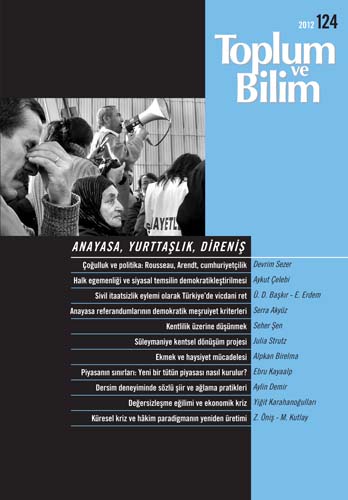Demokratik bir anayasanın siyasal yapıtaşları: Halk egemenliği ve siyasal temsilin demokratikleştirilmesi
AYKUT ÇELEBİ
Özet: Anayasalar sadece devlet organları arasındaki yetki ve hiyerarşiyi düzenlemez, aynı zamanda siyasal belgelerdir. Anayasaları yapan kurucu iktidar, halkın kurucu iktidarıdır. Kurucu iktidar siyasi bir faaliyet olup yönetimi yetkilendiren, yetki verme yetkisini haiz otoriteye karşılık gelir. Halk egemenliği, hem anayasaya yapmaya yönelen kurucu iktidara dair siyasal bir faaliyeti anlatır, hem de halkın kurucu iktidarınca yetkilendirilmiş yönetimin meşruluğuna karşılık gelen kurumsallaşmadır. Günümüzde halk egemenliği her iki anlamda da derin bir meşruiyet krizi yaşamaktadır. Temsilî kurumların “halkı” temsil etme konusundaki sorunları bir yana, ulusüstü ve ulusaşırı oluşumların siyasal karar alma mekanizmalarında etkili olmasıyla birlikte, hükümetlerin yetki alanı daralmıştır. Bu, yetki verme yetkisini, yani halk egemenliği ilkesini ve temsilî demokrasiyi de görece olarak önemsizleştirmiştir. Anayasa ve anayasacılığın önem kazandığı bir dünyada siyasal temsilin ve halk egemenliğinin değer kaybı, tarihsel bir anomalidir. Anayasayı siyasal teşekkülün dizginlenmesi ve denetimini sağlayan, depolitize bir araç gibi görenler, anayasa ve anayasacılığın tarihsel karakteri ve siyasal bağı konusunda hiçbir fikri olmayanlardır. Halk egemenliği ve onun kurumlaşmış biçimi olan siyasal temsilin ilgası ya da ortan kalkması söz konusu değildir. Her ikisini de ulusaşırı ve ulusüstü bağlamı içinde yeniden düşünmeye, halkı özcü çağrışımlarıyla değil, kurucu iktidar edimiyle düşünmeye birlikte ihtiyaç var.
Anahtar sözcükler: Halk egemenliği, kurucu iktidar, tâli iktidar, egemenlik, siyasal temsil, anayasa
***
The political constituents of a democratic constitution: Popular sovereignty and the democratization of political representation
AYKUT ÇELEBİ
Popular sovereignty is not a subset of a more general concept of sovereignty. It is not subsumed by the later. Sovereignty is the act of a command and the authority from above of a king or emperor whose authority has got theological origins. Popular sovereignty, on the contrary, is solely an authority to give competence to representative government by people who has no theological or any other trancendental origins. People is the name of subjectification process in which social struggles for recognition and entitlement makes it pure political concept. It is a sort of guarantee and measure for legitimacy of a government. Popular sovereignty is the creation of constituent power of people in which the act of constitution making is held possible. The constituent power of the people institues both people themselves as political citizen-subjects and co-(i)nstitues what the people as assembled and organized masses are decided upon a legitimate political regime. This is what we refer up to now as political representation. Nowadays representative government and popular sovereignty is in deep legitimacy crisis. On the one hand, supra national and transnational new political and economical actors and corporations make the representation obsolete. They decide upon the immediate global or regional problems, at least not alone, the national governments which they have claimed jurisdiction before over those problems and/or areas. That brings us the second dimension of the legitimacy crisis. Legitimacy of the people and the concept of popular soverignty have lost its quality of giving an authority to competence or entitlement on behalf of its acts. As a result of the inability of political and economical global power holders and transnational elites to authorize political decisions, the democratic gap in matters related to global policy resolutions are growing faster. Popular sovereignty and its constituent power to constititue is not a thing of the past. The call to democratic accountability and demand to democratic political partipation is even more vivid today.
Keywords: Popular sovereignty, sovereignty, constituent power, democracy, constitution, political representation

